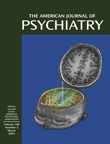Treating Acute Stress Disorder Following Mild Traumatic Brain Injury
Abstract
OBJECTIVE: Acute stress disorder permits early identification of trauma survivors who are at risk of developing chronic posttraumatic stress disorder (PTSD). This study aimed to prevent PTSD in people who developed acute stress disorder after a mild brain injury by early provision of cognitive behavior therapy. METHOD: Twenty-four civilian trauma survivors with acute stress disorder were given five individually administered sessions of either cognitive behavior therapy or supportive counseling within 2 weeks of their trauma. RESULTS: Fewer patients receiving cognitive behavior therapy than supportive counseling met criteria for PTSD at a posttreatment evaluation (8% versus 58%, respectively). There were also fewer cases of PTSD at a 6-month follow-up evaluation among those receiving cognitive behavior therapy (17%) than among those receiving supportive counseling (58%). Patients in the cognitive behavior therapy condition displayed less reexperiencing and avoidance symptoms at the follow-up evaluation than patients receiving supportive counseling. CONCLUSIONS: These findings suggest that PTSD following mild brain injury can be effectively prevented with early provision of cognitive behavior therapy.



